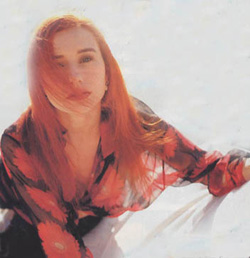|

songs | interviews | photos | tours | boots | press releases | timeline
Vogue (US)
June 1992

Tori Amos brings women's rock beyond the babe factor.
Alec Foege tunes in
The daughter of a Methodist preacher, Tori Amos, twenty-eight, embodies the dilemma of every post-eighties female musician: how to simultaneously radiate sense and seductiveness. While singing intensely personal songs, she wears hand-me-down performance garb -- blue-jean flares and a tank top -- that only further accentuates her brilliantly red hair, pouty lips, and piercing green eyes.
Sitting at a grand piano in a New York studio, warming up for a television taping, the North Carolina native looks somewhat droopy as she exercises her honeyed voicec by indulging in dazzling upper-register acrobatics. Fragments of her pretty yet provocative songs pass rapidly by, each progressively more chilling. Soon even the jaded production crew is murmuring in amazement, and Amos's face lights up.
This is the magnetic, mystical side of Tori Amos, who speaks in riddles and cannily describes herself in the song "Happy Phantom" as "Judy Garland taking Buddha by the hand." But another of her songs, "Me and a Gun," sung a capella, is a disarmingly frank, nonjudgmental account of a rape. Amos says it was inspired by personal experiences and seeing Thelma and Louise; all she'll say to explain is "When you take another person's choices away and you inflict yours on them, you've broken divine law."
This well-modulated anger even fuels Amos's most lyrical compositions. "So you found a girl who thinks really deep thoughts/What's so amazing about really deep thoughts?" she gibes on the first single, "Silent All These Years." By using victimization as impetus for empowerment, Amos has rescued women's pop from decades' worth of weepy, intrtospective types. "It's about being a humanist now," she says, "where you understand being a woman as being an individual, and respecting that. And also respecting what it's like to be a kid, respecting the environment, respecting the man's point of view. I choose to look at all sides."
Born Myra Ellen Amos, she grew up listening to show tunes from her mother's record collections and studied classical piano at the Peabody Conservatory in Baltimore from age five until eleven, when she was kicked out for "improvising." At thirteen she played the gay piano bars of Washington, D.C., and Baltimore. At seventeen she changed her name to Tori, then discovered Led Zeppelin. By twenty-two she had recorded an ill-fated album backed by a heavy-metal band, called Y Kant Tori Read. "I was putting my rebellion in my hair spray," she says now of that time. "I had mixed views of what strength was."
Amos moved to England in 1991 and won her first public acclaim there by pounding out her intricately arranged originals, legs splayed, at the upright pianos of London's numerous acoustic performance spaces. "I had to go through a phase of wearing big bags, absolutely no makeup, completely disclaiming anything female, because I felt like I had abused it," she explains in a mellifluous whisper familiar from her seductive songs. "Now I can be all things: I can be a mother, and I can rip your head off."
These days she sings praises of pretty dresses and the pink mohair sweater she's wearing. "Do I have to disclaim these things to have anything worthy to say?" she wonders. "I mean, what are the rules on the lipstick quotient? Because if I had to be on a desert island, I'd almost choose lipstick over water -- although it would crack."
[transcribed by jason/yessaid]
t o r i p h o r i a
tori amos digital archive
yessaid.com
|